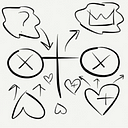Why Jesus? A Simplified Overview
My understanding of the Christian faith has changed over the decades. I am writing about that, but it is tricky to do so when I worry that people want a conclusion too soon. My first step is to present a very basic overview of what traditional apostolic faith claims.
{What follows is my VERY basic overview of Christian faith I recently tweeted and then tidied up into one post.}
The Christian faith says that life is from God but that humanity is significantly disoriented in regard to what life is supposed to be about.
{The details of how/when it all started are less important than the imagery/message that launches the Bible. That is why poetry is used to start Genesis to say true things in ways that are not entangled in mechanics but focus on the meaning.}
The mini version of order/chaos, or ideal/real, or creation/fall, or blessing/curse, is laid out in the beginning of the book of Genesis. Humanity is ideally supposed to be in harmony w/ God & nature but we are apparently rather destructive and contentious.
Genesis chapter 12 starts the story of God working through Abraham to bless humanity to be a blessing; to rediscover our identity & calling to connect harmoniously with God, one another, & nature.
Abraham to the Exodus to Israel to Exile reveals the very wild & uneven struggle to understand God’s revelation about human identity and purpose. Those stories are designed to show the failures of Ancient Near East thinking in regard to power & control. *This is seldom understood.
Jesus is presented as the descendant of Adam (Hebrew for “humanity”) and of Abraham and David, etc. Jesus re-enacts much of the story of Israel in ways that show where Israel went wrong. Jesus says this in his teaching( i.e.when he uses non-Jews as positive examples to correct Israel.)
Jesus displays harmony with God/humanity/nature in a variety of ways that reverse chaos & suffering to provide shalom (well-being/harmony/flourishing).
The powerful religious and political leaders see his explanations/revelations of life as a threat to their controlling narratives.
Jesus rejects giving into fear and displays courage and love as he speaks truth in words and deeds instead of countering them with power (their methods for coping).
Jesus trusts God as the self-existent source of life & meaning. Jesus is raised to life out of death. He is vindicated. This is the Gospel of the Kingdom.
Jesus rallies his remaining disciples to follow him as the revelation of God to humanity, including what it means to be fully human through sacrificial love that seeks reconciliation of/for all. Those who trust Jesus multiply rapidly across traditional lines of human divisions. This brings persecution from religious and political powers.
Letters are written to Jesus-communities to help them process their struggles in light of the promises of Christ. They are reassured that the way of the cross, sacrificial love in the face of threats, is right even though it is not easy or obvious.
Pursuing maturity (telos) in Jesus’ ways (agape) is the focus of these letters.
Apocalypse = unveiling; revealing the mysteries that remain.
Using ancient imagery the followers of Jesus are told that even in triumph as The Lion of Judah Jesus is actually still a sacrificial Lamb. Using his words and deeds he will overcome human rebellion and harmony will be established.
This “Way of the Lamb” continued to spread across the centuries & continents alongside many distorted versions of domineering & harsh “Christendom.” Today many people try very hard to reconcile Christendom to Jesus and either undermine Jesus in their ethics or give up on Jesus.
I personally believe that Jesus is the ultimate revelation of what it means to be human. There are huge amounts of questions I have about how it all works, but my focus is on character development according to the Way of the Lamb.
- End Summary-
PS
My 3yr old grandson asks me questions about all sorts of things around us. He wouldn’t understand the answers to many of those even if he had the patience to wait for my answers. He helps me see how some of my own questions are not as important to me living well as I once thought.
I have TONS of questions about origins, history, epistemology, inclusion, the future, etc. I used to look to find THE Answer Person… but the answer people just argue with other answer people, both near & far to their own answers. So… I try to keep it simple.
I’m pretty sure that following sacrificial love is ok and that Jesus (when not misappropriated) is as good as it gets in guiding the way of sacrificial love that affirms life and harmony of God, humanity, and nature.
Video summary showing how humanity is meant to bear the image of God on earth as a way of harmony and flourishing:
My own summary is one sentence that can be displayed in one picture.
The Bible unfolds a story in which Jesus reveals a way of sacrificial love and invites us to plant our faith in him such that we are rooted in hope while branching out with empathetic love in ways that bless people and glorifies God.
